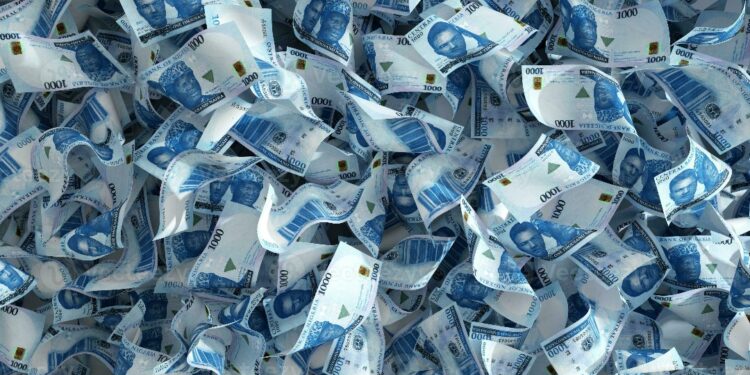The Naira, Nigeria’s currency, is the most visible symbol of the country’s economic identity and stability. It is of great importance to the nation’s economy and the well-being of citizens. The integrity of the Naira therefore strengthens the integrity of Nigeria’s nationhood.
What this implies is that the Naira deserves to be treated like the delicate product it is. It deserves to be handled with utmost care bordering on reverence. Sadly, over the years, the currency has been treated like an orphan, manhandled, beaten, damaged and in some cases, destroyed. It is often said that the Naira is the currency that suffers most abuse and mutilation by its citizens.
Until recently, not many people were aware of the existence of legal consequences for improper handling of the Naira. O yes, this is true. Although it is often parodied that ignorance is not an excuse in law, the simple truth is that genuine ignorance is an inhibition to upholding or obeying the law. However, law or no law, should citizens treat the national currency with disrespect, the way some people do?
Many people, especially those oblivious of their civic, patriotic and nationalistic responsibilities, manhandle the Naira in ways unbecoming. Spraying the Naira has since become a regular feature at parties, weddings and some other social events. The sprayers, dancers and others consciously march on the notes as they drop to the floor. Others squeeze, tear, soil and even burn the currency.
Yet, Section 21 (3) of the Central Bank of Nigeria, CBN, Act 2007 as amended, clearly criminalises the mutilation or any other form of manhandling of the Naira. It stipulates that “spraying of, dancing or marching on the Naira or any note issued by the Bank during social occasions or otherwise howsoever shall constitute an abuse and defacing of the Naira or such not and shall be punishable under the law by fines or imprisonment or bot”.
It is important to further stress the fact that it is illegal to spray Naira notes, march, dance or stamp our feet on them, staple or tear them. It is also illegal to sell, mutilate, reject the notes or turn them into bouquets for the purpose of gifting. Traders or mechanics who carelessly handle the Naira and in the process rob palm oil, engine oil or petrol on the notes should take heed that they can be called to account by law enforcement agencies.
Though the law against the mutilation of the Naira is not new, its enforcement had been non-existent or half-hearted until recently. The recent conviction of Idris Olarewaju Okuneye, aka Bobrisky on April 5, 2024 for abusing the Naira is perhaps what has drawn the attention of the nation back to the law. Justice Abimbola Awogboro of the Federal High Court in Lagos, on April 12, 2024, sentenced Idris to 6 months in prison without an option of fine for spraying Naira notes.
Read More: Akume is Indisputable Political Leader of Benue – Ortom
Many commentators faulted the judgment for not giving an option of fine. They argue that the judgment may be a way of getting at the convict because of his transgender status, a lifestyle which does not go down well with most Nigerians. If the efficiency and speed with which the EFCC arrested, arraigned and secured a conviction was pleasantly suspect, the promptness of the trial, conviction and sentencing of Idris by the Judiciary also came as a surprise. It only goes to confirm what many had believed – that when the stakeholders make up their minds, justice can be delivered promptly.
To prove that the trial of Idris was not a case of profiling but part of a general campaign, the EFCC also arraigned Pascal Okechukwu, alias Cubana Chief Priest, before the Federal High Court, Ikoyi-Lagos on April 17, 2024 for allegedly spraying and tampering with Naira notes. The presiding judge, Justice Kehinde Ogundare admitted him to bail in the sum of N10 million and adjourned the case to May 2, 2024.
Before the last two cases, Justice Chukwujekwu Aneke of the Federal High Court sitting in Ikoyi Lagos had, on February 2, 2024, convicted and sentenced Oluwadarasimi Omoseyin to six months imprisonment with an option of 300,000 fine, for spraying and stepping on new Naira notes at a wedding in Lekki-Lagos on January 28, 2023.
More of such arrests and convictions should happen. For those wondering why this fight is just being given a bite, it took the coming on board of the current Chairman of EFCC, Mr Ola Olukoyede to make it happen. On February 7, 2024 he raised a Special Task Force against currency racketeering, dollarization of the Nigerian economy, abuse and mutilation of naira notes across the country. Barely 3 months old, it is expected that the task force would pull more abusers of the Naira into the dragnet of the law to face the music.
In case you are also wondering what an ant-corruption agency has got to do with the mutilation of the Naira, know that corruption has many colours. But as a citizen, if you are pained by the action, you have the locus standi to challenge the agency’s power to arrest and prosecute Naira abusers. And while you are at it, don’t forget to draw its attention to those bent on messing with the integrity of our currency.
The abuse of the Naira is a reflection of the disdain we hold our national values and assets. Sadly, it is in the same way the National Anthem and Pledge are being abused, sang and recited ‘anyhowly’! The National Flag is not spared this embarrassing treatment. As a people, we have a lot of work to do to ensure that every citizen respects and upholds the dignity of our national values.
The prayer is that the EFCC and other stakeholders in the battle against the abuse of the Naira would sustain the tempo of the current success. The Law must continue to bare its fangs to check and eventually end the corrosive abuse of the Naira. And in this fight, there must be no sacred goats!






